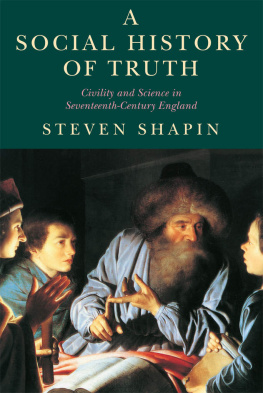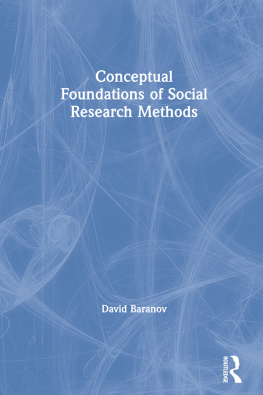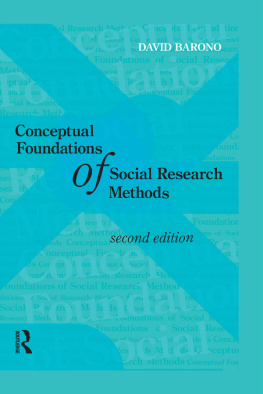Steven Shapin - A Social History of Truth (Science and Its Conceptual Foundations series)
Here you can read online Steven Shapin - A Social History of Truth (Science and Its Conceptual Foundations series) full text of the book (entire story) in english for free. Download pdf and epub, get meaning, cover and reviews about this ebook. year: 2011, publisher: University of Chicago Press, genre: Religion. Description of the work, (preface) as well as reviews are available. Best literature library LitArk.com created for fans of good reading and offers a wide selection of genres:
Romance novel
Science fiction
Adventure
Detective
Science
History
Home and family
Prose
Art
Politics
Computer
Non-fiction
Religion
Business
Children
Humor
Choose a favorite category and find really read worthwhile books. Enjoy immersion in the world of imagination, feel the emotions of the characters or learn something new for yourself, make an fascinating discovery.
- Book:A Social History of Truth (Science and Its Conceptual Foundations series)
- Author:
- Publisher:University of Chicago Press
- Genre:
- Year:2011
- Rating:3 / 5
- Favourites:Add to favourites
- Your mark:
- 60
- 1
- 2
- 3
- 4
- 5
A Social History of Truth (Science and Its Conceptual Foundations series): summary, description and annotation
We offer to read an annotation, description, summary or preface (depends on what the author of the book "A Social History of Truth (Science and Its Conceptual Foundations series)" wrote himself). If you haven't found the necessary information about the book — write in the comments, we will try to find it.
A Social History of Truth (Science and Its Conceptual Foundations series) — read online for free the complete book (whole text) full work
Below is the text of the book, divided by pages. System saving the place of the last page read, allows you to conveniently read the book "A Social History of Truth (Science and Its Conceptual Foundations series)" online for free, without having to search again every time where you left off. Put a bookmark, and you can go to the page where you finished reading at any time.
Font size:
Interval:
Bookmark:
This book has been brought to publication with the support of a grant from the National Endowment for the Humanities, an independent federal agency, and both author and publisher acknowledge this support with thanks.
The University of Chicago Press, Chicago 60637
The University of Chicago Press, Ltd., London
1994 by The University of Chicago Press
All rights reserved. Published 1994
Paperback edition 1995
Printed in the United States of America
16 15 14 13 12 11 5 6 7 8
ISBN-13: 978-0-226-75018-7 (cloth)
ISBN-13: 978-0-226-75019-4 (paper)
ISBN-10: 0-226-75018-3 (cloth)
ISBN-10: 0-226-75019-1 (paper)
ISBN 978-0-226-14884-7 (e-book)
Library of Congress Cataloging-in-Publication Data
Shapin, Steven.
A social history of truth : civility and science in seventeenth-century England / Steven Shapin.
p. cm. (Science and its conceptual foundations)
Includes bibliographical references and index.
1. ScienceSocial aspectsEnglandHistory17th century. 2. ScienceMoral and ethical aspectsEnglandHistory17th century. I. Title. II. Series.
Q175.52.G7S48 1994
306.4'5'094109032dc20
93-41950
CIP
 The paper used in this publication meets the minimum requirements of the American National Standard for Information SciencesPermanence of Paper for Printed Library Materials, ANSI Z39.48-1992.
The paper used in this publication meets the minimum requirements of the American National Standard for Information SciencesPermanence of Paper for Printed Library Materials, ANSI Z39.48-1992.
STEVEN SHAPIN
A Social History of Truth
Civility and Science in Seventeenth-Century England
THE UNIVERSITY OF CHICAGO PRESS
CHICAGO AND LONDON
Science and Its Conceptual Foundations
David L. Hull, Editor
For T. L. Martin, Gent.
Sayest thou this of thyself, or did others tell it thee... ?
John 18:34
It is a fundamental belief of all aristocrats that the common people are untruthful. We truthful onesthe nobility in ancient Greece called themselves.
It is obvious that everywhere the designations of moral value were at first applied to men, and were only derivatively and at a later period applied to actions.
Nietzsche, Beyond Good and Evil
Contents
Illustrations
Figures
Table
Acknowledgments
A book so long in the making acquires many intellectual debts. Most of these obligations are acknowledged in formal citations, but I fear that some are not, or are, at best, inadequately recognized. Versions of some of the material presented here were inflicted on a great many tolerant audiences over the past eight years or so. These include seminars at the universities of Cambridge, California at Berkeley, California at Los Angeles, Chicago, Cornell, Griffith, Harvard, the Hebrew University of Jerusalem, Johns Hopkins, London (University College), Manchester, Melbourne, New South Wales, Notre Dame, Oxford, Pittsburgh, Princeton, Tel-Aviv, and Wollongong. Members of all these audiences must have assisted this project in more ways than I can readily recall.
Individuals who have offered valuable information, criticisms, or comments are, again, too numerous for properly inclusive enumeration, but they include J. A. Bennett, Mario Biagioli, Jeffrey Brown, H. M. Collins, Lorraine J. Daston, Michael Aaron Dennis, Yaron Ezrahi, Mordechai Feingold, Daniel Garber, J. V. Golinski, Rob Hagendijk, Willem Halffman, Hans Harbers, John Henry, Michael Hunter, Robert Iliffe, Adrian Johns, Robert Kohler, Bruno Latour, John Law, Julian Martin, David Philip Miller, Iwan Rhys Morus, Andrew Pickering, Trevor Pinch, Theodore Porter, Jacques Revel, John Schuster, Susan Leigh Star, Sharon Traweek, Jay Tribby, and Andrew Wayne. I have discussed some of the ideas in this book with Peter Dear and Simon Schaffer over so many years, and in so many places, that I cannot confidently estimate the extent of my debt to them. A series of friendly arguments with my colleague Philip Kitcher over the past several years has considerably sharpened an exercise which he will still, no doubt, regard as lamentably fuzzy and philosophically naive. I hope he will not object to being thanked in this connection. At an early stage of writing, portions of the manuscript were read by David Bloor and Michael Lynch, each of whom offered detailed and enormously constructive criticisms at a time when I was most able to benefit from them. Charles Rosenberg, Andrew Scull, and Philip Kitcher kindly read over much of the completed manuscript and made a number of penetrating criticisms, some of which only pressure of time made me decline to take up. My friend Christopher Martyn is a scientist who has (at times unwittingly) taught me some common sense about the moral economy of modern science which I was happy to dress up in fancy language and present as my own.
I owe far more than the usual debt to three very diligent and very competent readers for the University of Chicago Press. My editor Susan Abrams has been a continuing and much-valued source of support, encouragement, and sound advice. It has been a pleasure and a moral education working with her. My copy editor Michael Koplow has my gratitude for caring as much about getting it right as I do.
Interlibrary loan staff at my own university were extremely helpful: without their assistance this book would have taken very much longer to complete. I also thank staff at the University Library of Cambridge University, the Whipple Museum of the History of Science at Cambridge University, the National Library of Scotland, and the Royal Society of London. I thank the Fellows and Council of the Royal Society for permission to use and quote from the Boyle Papers and other manuscripts in their possession.
A slightly different version of is a greatly revised version of Robert Boyle and Mathematics: Reality, Representation, and Experimental Practice, Science in Context 2 (1988), 2358. I thank Cambridge University Press for permission to use some of that material here.
This book was largely written during academic leave from the University of California, San Diego, in 19911992, supported by fellowships from the National Science Foundation and the University of California Presidents Initiative in the Humanities. Small summer research grants from the University of California, San Diego Academic Senate, supported an early stage of this work. I am honored to acknowledge a very special debt to Mr. Gerry Martin and the Renaissance Trust.
September 1992
Lochinver, Sutherland
Notes on Genres, Disciplines, and Conventions
What Kind of Book?
A Social History of Truth is concerned with questions about the grounds of scientific knowledge which have traditionally been the preserve of philosophers; it uses evidence and techniques customarily owned by historians; and the conclusions it arrives at are broadly sociological in form and substance. For all that, it was not initiated with any special intent to celebrate interdisciplinarity or deliberately to mix, merge, or mangle disciplinary procedures. Rather, it is the upshot of years of engagement with questions whose exploration has taken me at some angle from the trajectories of colleagues more comfortable in their disciplinary identities. I have followed the questions, and the resources for addressing them, wherever they happened to be in the academic culture. My purpose is not to blur the genres of history, sociology, and philosophy of science, but to assist in the reconstitution of what might count as historical practice, and to make a theoretically driven detailed historical narrative the sort of thing which engages the attention of philosophers and sociologists because they recognize it as a significant way of dealing with their problems. There seems no good reason why practitioners, including myself, writing about the past should not be called historians, but I cannot insist on that honor.
Next pageFont size:
Interval:
Bookmark:
Similar books «A Social History of Truth (Science and Its Conceptual Foundations series)»
Look at similar books to A Social History of Truth (Science and Its Conceptual Foundations series). We have selected literature similar in name and meaning in the hope of providing readers with more options to find new, interesting, not yet read works.
Discussion, reviews of the book A Social History of Truth (Science and Its Conceptual Foundations series) and just readers' own opinions. Leave your comments, write what you think about the work, its meaning or the main characters. Specify what exactly you liked and what you didn't like, and why you think so.









